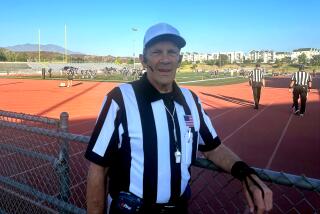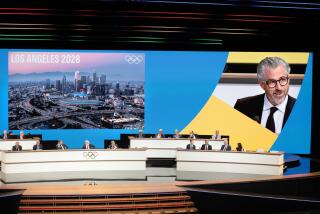‘Baywatch’ Prototype Lifeguard Retiring
- Share via
Brace yourself, Baywatchers. The lifeguard in Los Angeles is retiring.
No, it’s not the actor David Hasselhoff, nor the earnest lifesaver he plays on that internationally famous sun-and-surf TV adventure. It’s Don Rohrer, the county’s chief lifeguard and undoubtedly the prototype for Hasselhoff’s Lt. Mitch Bucannon.
After a lifelong career combing county beaches, Rohrer is dry-docking his paddle boat and stowing his rescue can. He is 60 and can still swim around the Venice Pier in about 12 minutes, or take 10 to do 500 meters in a pool. After 44 years, he has saved an estimated 2,000 drowning swimmers.
Rohrer was unavailable Thursday, while he drove up and down the coast accepting the congratulations of colleagues. That evening about 350 well-wishers and beachniks gathered in Santa Monica for a retirement bash at the Museum of Flying.
“You couldn’t ask for a better person to work for,” said Assistant Chief Lifeguard Randy DeGregori, who joined the department in 1964 and through the years has been supervised by Rohrer in one capacity or another. “He expects you to do the right thing and it’s easy to work for a man like that.”
Long before CPR, before even mouth-to-mouth resuscitation, the teenager Rohrer hoisted himself into the observation tower at Playa del Rey Beach and went to work for the City of Los Angeles when the back-pressure-armlift was the standard inhalation therapy. That was in 1952.
Today, lifeguarding has gone high-tech, with radios, radar, homing devices, resuscitators, defibrillators, four-wheel drives, helicopters and, of course, the famous Baywatch rescue boats. For many years Rohrer was the captain in charge of rescue boat operations.
In the days before the county consolidated services first with Santa Monica in 1973 and then with Los Angeles in 1975, beach lifeguarding relied more on manpower and less on equipment. The approach was different, too.
“The lifeguards would wait for obvious signs of distress or for someone to yell ‘Help,’ ” DeGregori said.
More to Read
Sign up for The Wild
We’ll help you find the best places to hike, bike and run, as well as the perfect silent spots for meditation and yoga.
You may occasionally receive promotional content from the Los Angeles Times.






